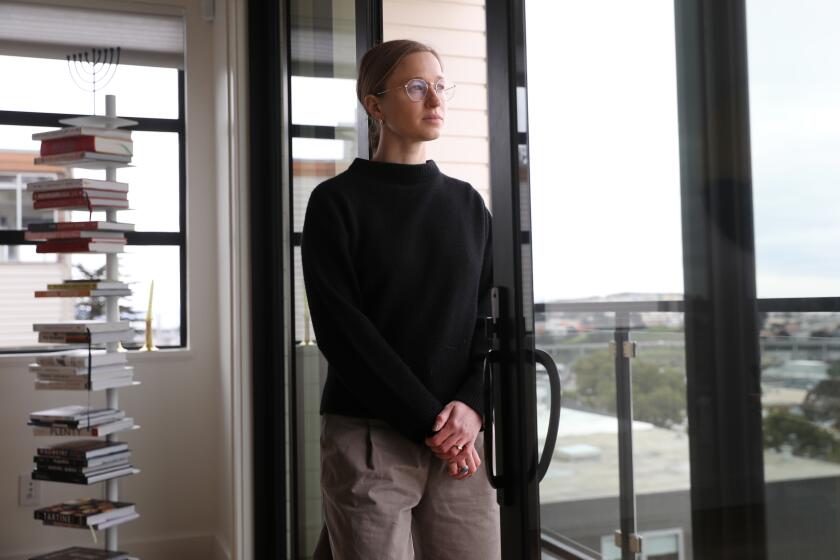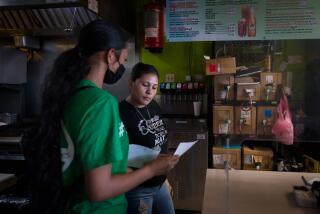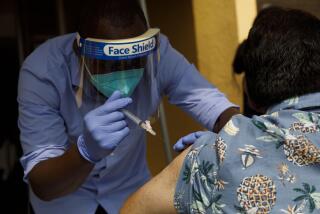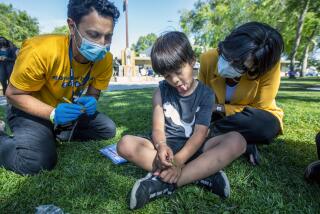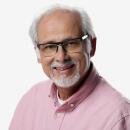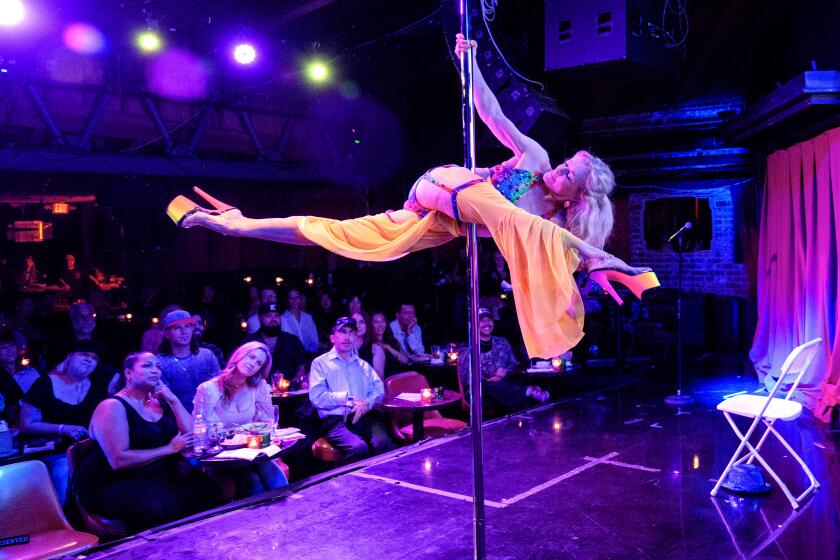Travel nurses come from all over the Unites States to aid overburdened healthcare systems. As of mid-March, the California Department of Public Health has deployed nearly 2,000 such nurses across the state to help with COVID-19 vaccinations.
Reshicka Upshaw wakes before dawn to get her children ready for school. She makes sure their teeth are brushed, their clothes clean, their homework done.
Sometimes she prays with them before she starts work:
Holy Spirit, you are welcome here. Lead us, guide us, teach us and comfort us as only you know how. Hallelujah.
“Here” is the tricky part of the prayer. Her children live in Cincinnati. Upshaw’s job is more than 2,000 miles away at a COVID-19 vaccination site in hard-hit San Bernardino County. Her prayer is a text.
The 40-year-old Upshaw is a travel nurse, one of a band of sisters and brothers who have flown in from all over — Detroit, Syracuse, N.Y., Dyersburg, Tenn., and beyond — to aid and comfort California’s overburdened healthcare system during the year-long pandemic.
They have witnessed golden California — the fifth-largest economy in the world — in its most fragile state.
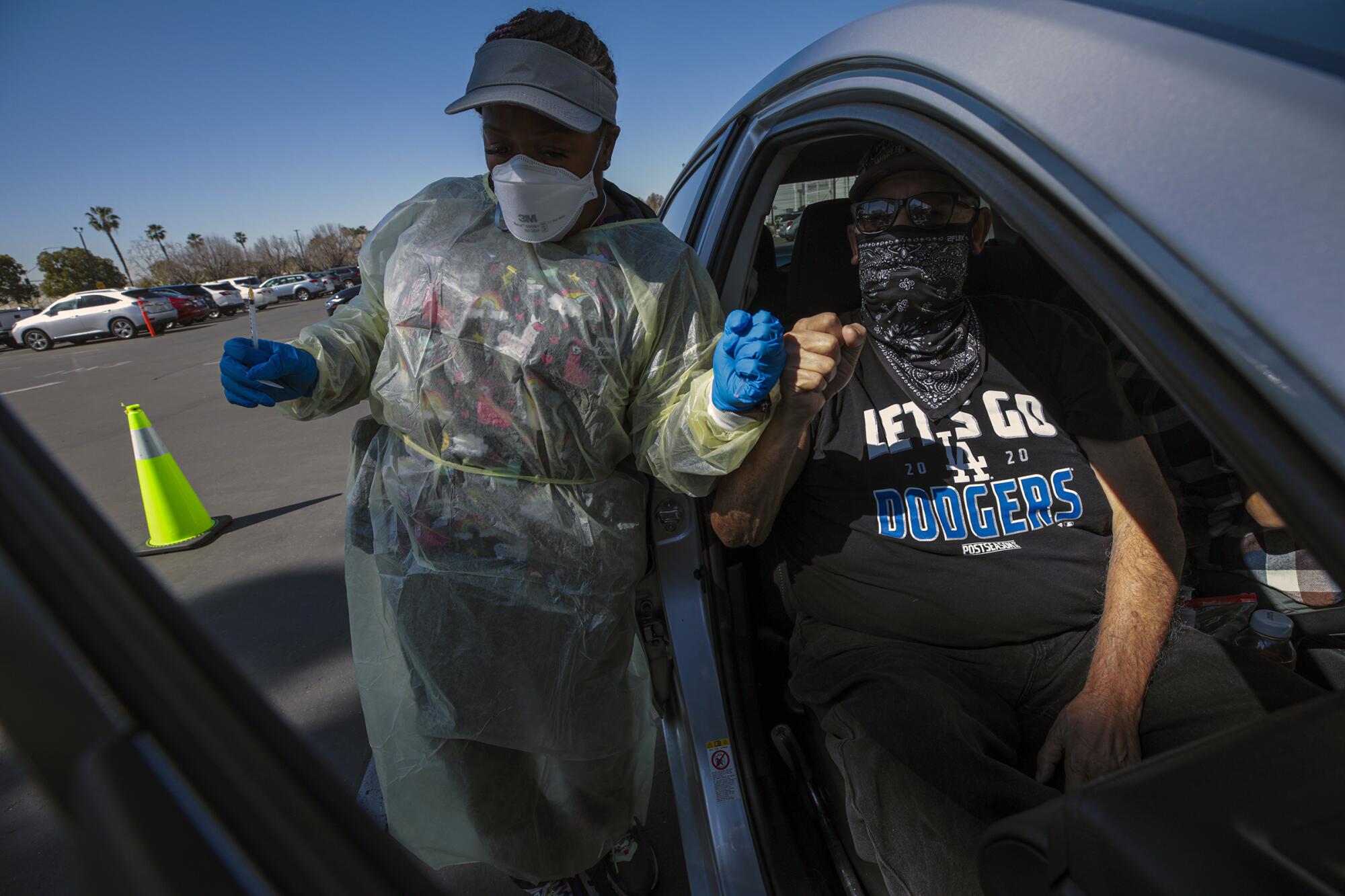
As of March 15, there were nearly 2,000 travel nurses deployed by the California Department of Public Health across the state to help with vaccinations. In San Bernardino County, including Upshaw, there are 160 SnapNurse workers.
“We had a sense of relief when we saw their five buses arrive,” said Melissa German, public health program manager for San Bernardino County. “It’s just what we needed. We wouldn’t have been able to do it without them.”
It had been a journey.
From the front lines of an intensifying mental health crisis, she shouldered 12 months of anxiety, isolation and fear. To endure it, she baked.
Upshaw didn’t tell her siblings she was going to California until she was on the plane.
It was a rough last year for the family. In June, about 30 family members — her eight children, five of her siblings, cousins and Upshaw herself— tested positive for the coronavirus. Upshaw endured headaches and body aches and lost her sense of taste and smell; she couldn’t even catch the odor of her 1-year-old daughter’s dirty diaper.
“By the grace of God, all of us survived,” she said.
In August, after she had recovered, Upshaw told her family that she wanted to work as a travel nurse. It had been a lifelong dream to travel and help people across the country.
“You could die,” her brother said. So she held off.
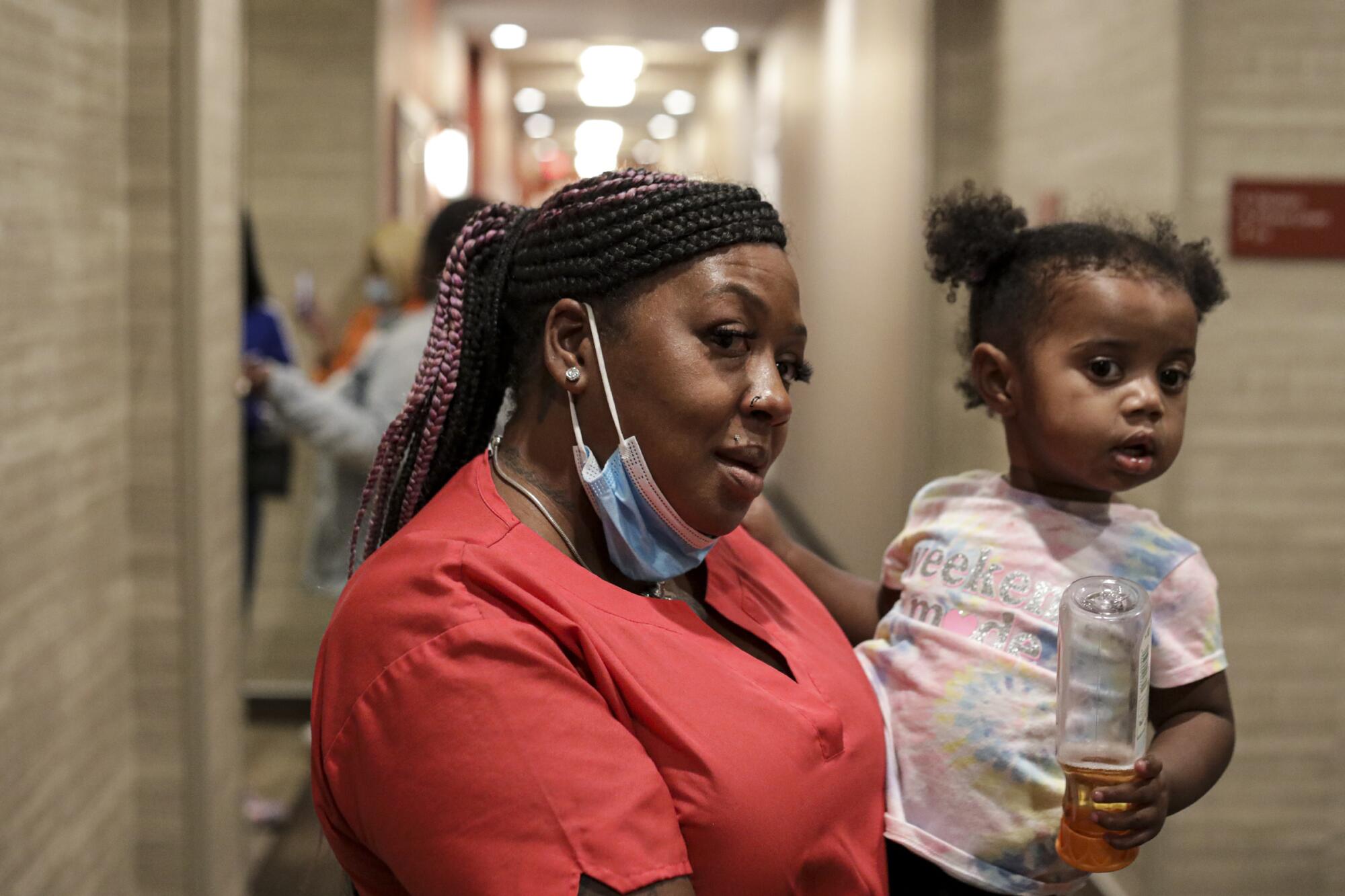
But the licensed practical nurse still took on a risky assignment, working with COVID-19 patients at a nursing home. Then a friend told her about giving vaccinations as a travel nurse.
First, she talked it over with her children. Her 22- and 24-year-old daughters agreed to care for their younger siblings, including the baby, their brother and their 13,- 16- and 18-year-old sisters. But, her daughters told her, “You can only do 30 days.”
Three days after she applied, on Jan. 20, Upshaw awoke to an email with her plane ticket — for that afternoon.
“This was my opportunity to jump out and put the fear behind me,” she said.
For decades, travel nurses have flown across the country to aid hospitals struggling with nursing shortages. Employed by agencies, they typically work on short-term contracts at elevated wages.
SnapNurse, founded in 2017, saw a significant increase in demand for travel nurses last year, said Cherie Kloss, the founder and chief executive.
The agency, which has around 5,000 workers in the field, is 90% Black. Black Americans disproportionately work in essential jobs and don’t have the luxury of working from home. The rate for Black Americans with COVID-19 was almost two times higher than for white Americans, according to the federal Centers for Disease Control and Prevention.
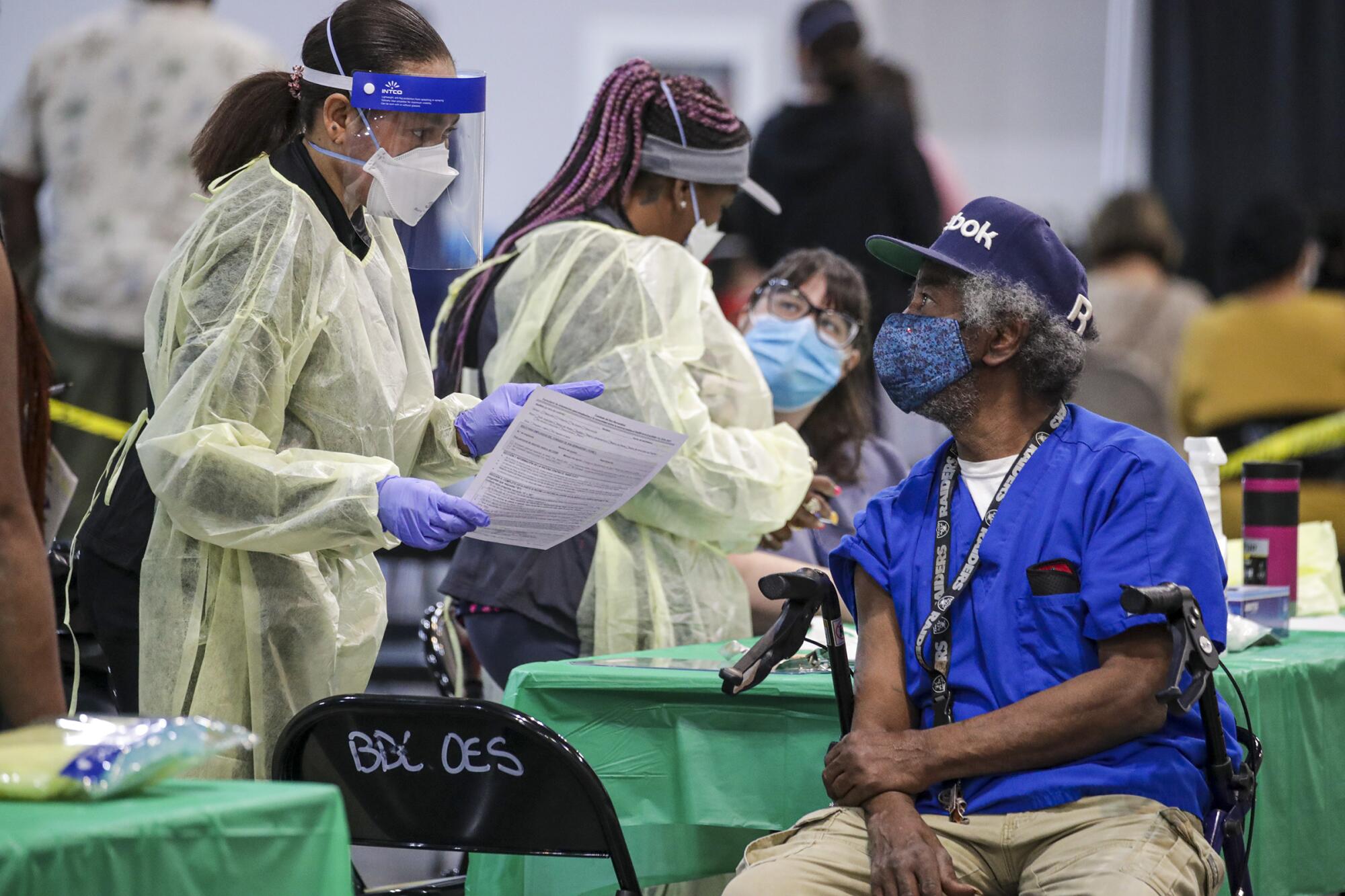
Upshaw had seen the virus’ toll firsthand, so helping vaccinate would allow her to contribute while avoiding more risky duty. Still, she wondered how relatives would react — and before she put her phone on airplane mode, she texted her siblings, cousins and aunts that she was heading to California. Most of them wished her safe travels.
“What a fine way to tell us,” her brother responded.
Upshaw explained that she wouldn’t be working with COVID-19 patients. Her brother eventually came around.
Her children had worried about her staying more than a month, but once Upshaw got to California they were more at ease. She talked her 26-year-old daughter — also a nurse — into coming a week later.
“It’s important to save as many lives as I can possibly save,” Upshaw said. “One vaccination at a time.”
The travel nurses stepped off charter buses and out of rental cars, well before county residents lined up outside the Ontario Convention Center. The nurses wore gray and blue scrubs and carried coffee to steel themselves for the 10-hour day ahead.
Upshaw had already been up for hours after calling her 8-year-old son to make sure he was ready for class. Some days Upshaw woke up at 3:35 a.m. for these calls; other days she was able to “sleep in” until 5:25 a.m.
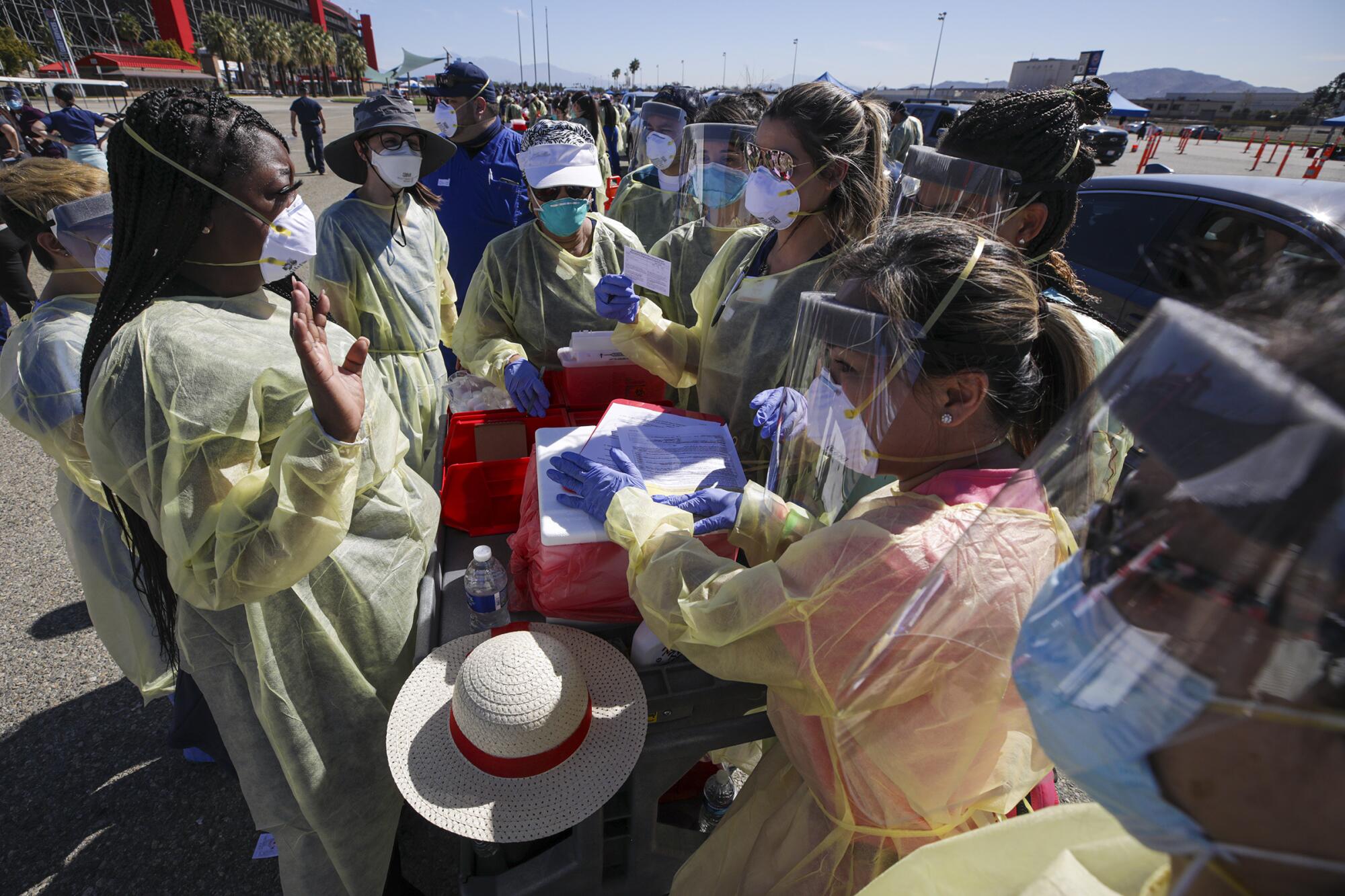
“I woke up this morning, that’s the best part,” Upshaw said.
The vaccination site was fully booked, with 440 appointments for the morning and 600 in the afternoon.
“Today might be the day we hit a thousand, guys,” said Adrianna Nelson, the site manager. “If we hit that, I’m going to have to get our sparkling cider.”
Some nurses administered vaccines, others did data entry or staffed the observation area. Upshaw was the floater for the day, filling in where needed.
“It’s important to save as many lives as I can possibly save. One vaccination at a time.”
— Reshicka Upshaw, traveling nurse from Cincinnati, Ohio
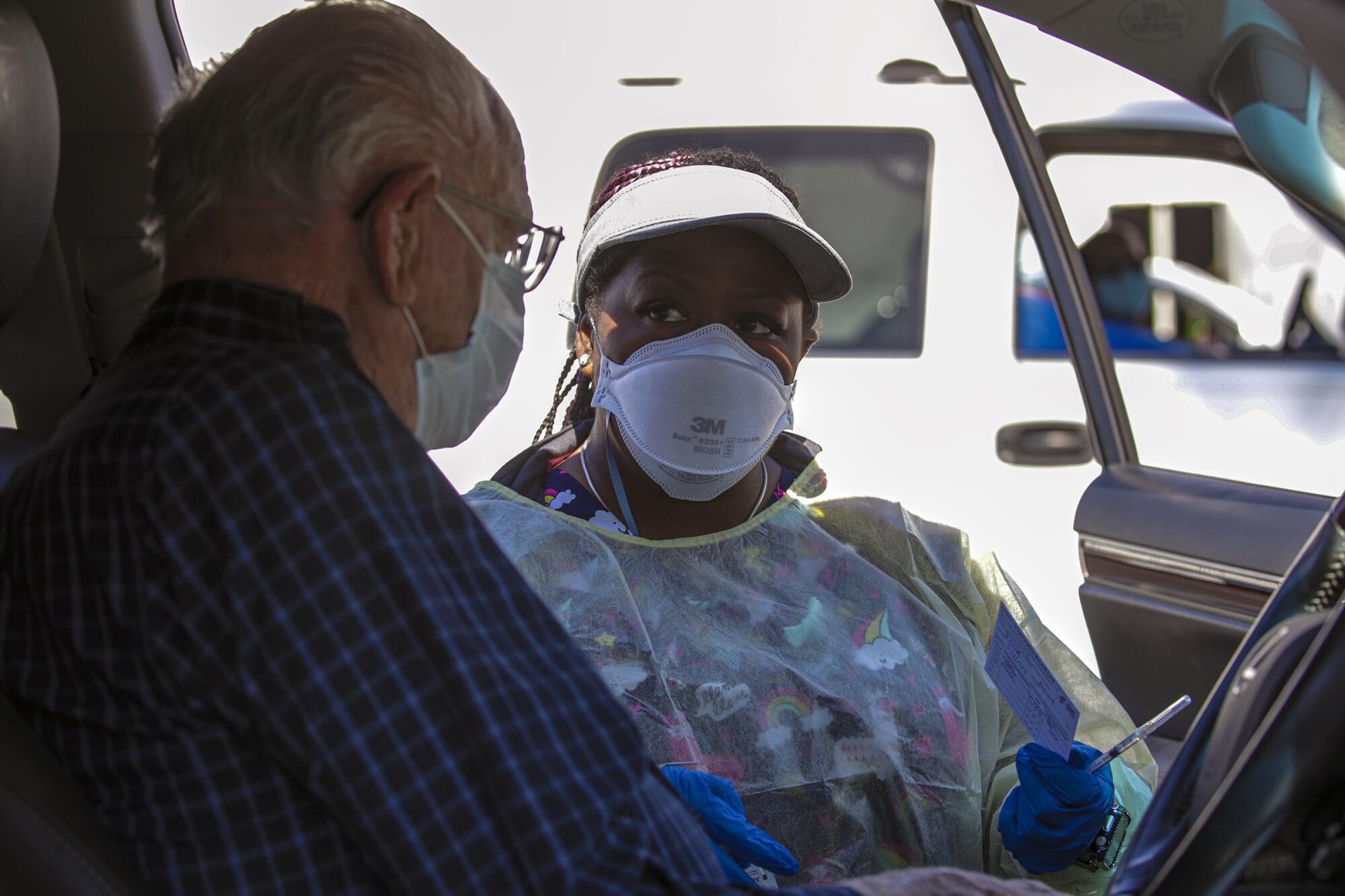
Five minutes before the site opened at 10 a.m., Upshaw grabbed her gray visor and headed to the vaccination station outside, meant for residents who needed to get the shot while in their cars because of mobility issues. The nurses stored the Pfizer vaccine bottles inside a red cooler to protect them from the California sun.
Nearby, there were already 40 people in line waiting to get into the convention center. Some leaned on walkers and canes, joked with strangers and thanked workers taking their temperature.
Upshaw estimates that she’s given at least 800 vaccines since she arrived in late January. Residents have invited her to church and to join them on vacation in Hawaii. More than one person has told her she has “the hands of an angel.”
“I get a lot of them that pray for me,” she said.
Within 20 minutes of the site opening, Alejandra Rodriguez and her husband, Ricardo Martinez, were directed into a parking space in front of the vaccination station. Like in a fast-food drive-through, Upshaw asked the screening questions through the Camry’s windows.
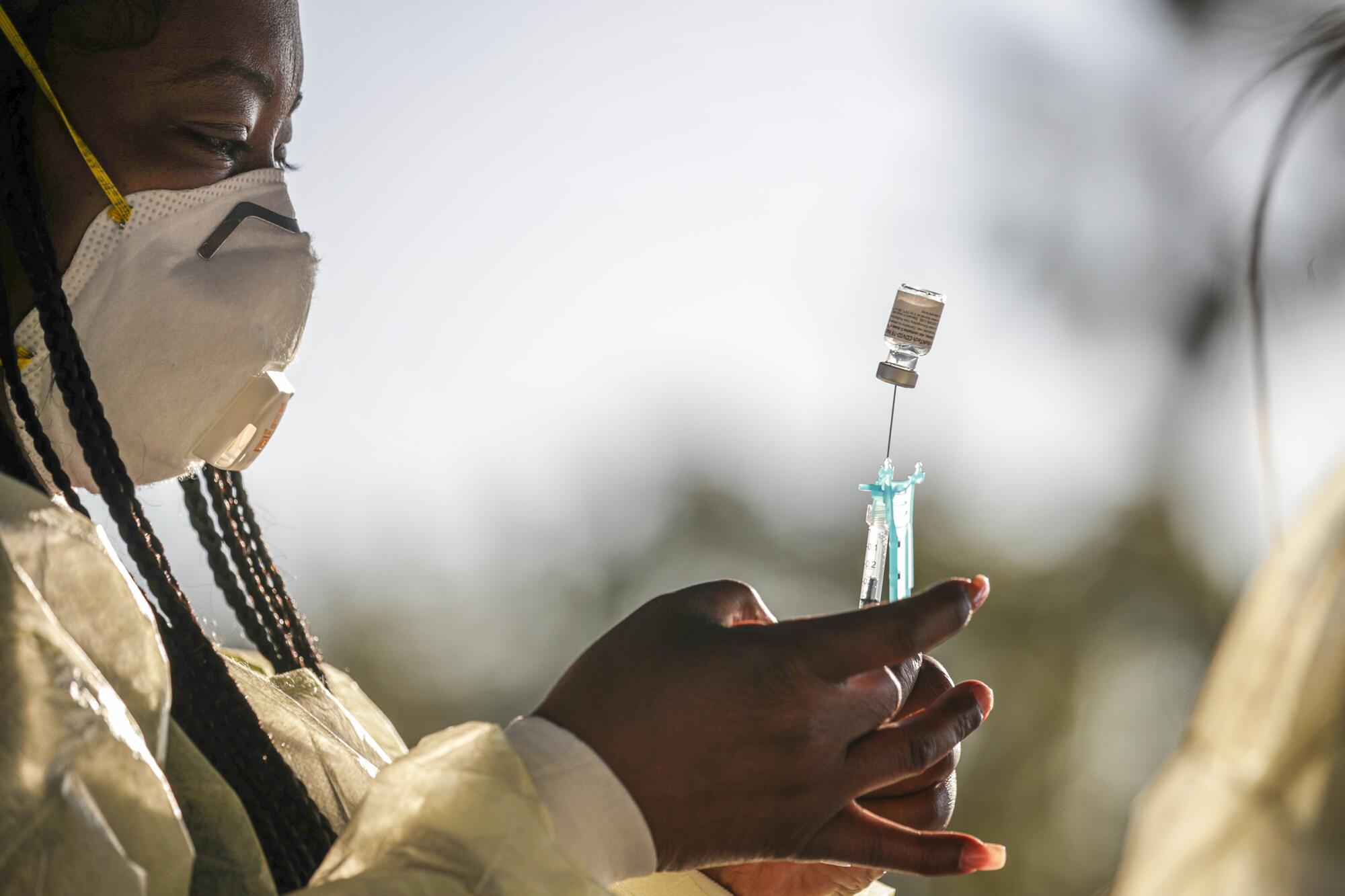
In the last two weeks, had they tested positive for COVID? Did they have any ongoing symptoms? Any allergic reactions to vaccines in the past?
“Are you pregnant over there?” Upshaw asked Martinez, which prompted his wife to burst out laughing. The joke helped ease their nerves.
Upshaw put a check mark on a Post-it Note that she stuck to the windshield. It meant that the couple were ready to be vaccinated. Another nurse, Leshea Moore, came over and swabbed Rodriguez’s arm with an alcohol wipe through the driver’s side window before she pushed the needle into her skin.
It was over in less than 10 seconds. Moore scribbled “10:41” — 15 minutes from then — on the Post-it to signal the end of the observation period.
“Thank you so much for coming out today,” Moore said.
This was the 35-year-old’s first stint as a traveling nurse. When Moore told family members in Detroit that she was leaving for California, they came to her house, gathered in a circle and prayed that she wouldn’t catch COVID-19. They acted, Moore said, “like I was about to go to war or something.”
But there was no misery of war here, only joy and tears of relief.
“They feel like they’re getting closer to a chance to see their loved ones. That’s what it’s all about, just giving the world some sense of comfort,” Moore said. “It might not be OK, but we are working toward a better way.”
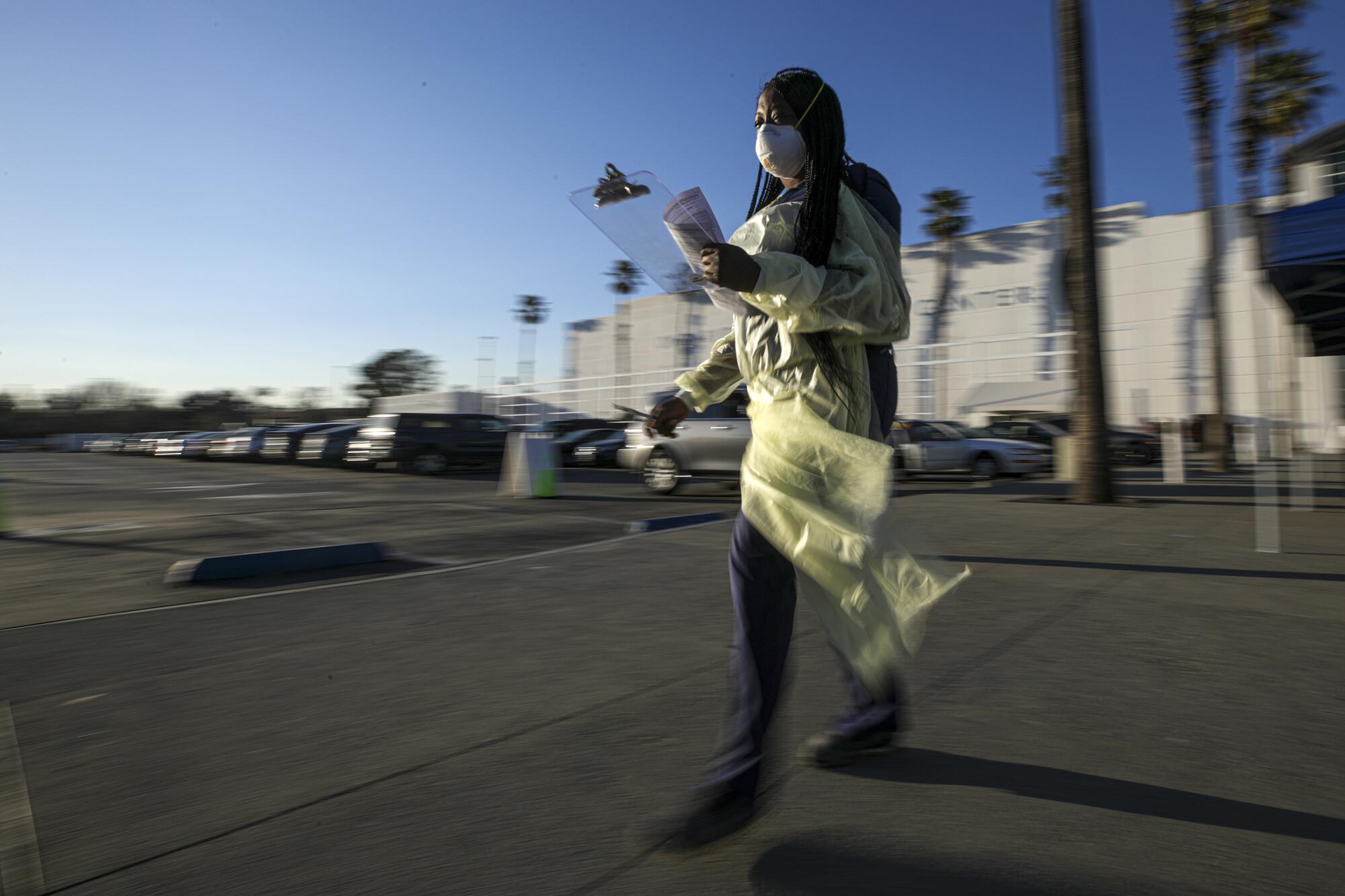
Upshaw was also waiting to see her loved ones, though she took comfort in knowing her daughter was giving vaccinations just an hour away in Joshua Tree. They would often meet halfway for dinner.
That morning, she fielded calls from her son who told her his baby sister needed Pampers instead of Pull-Ups.
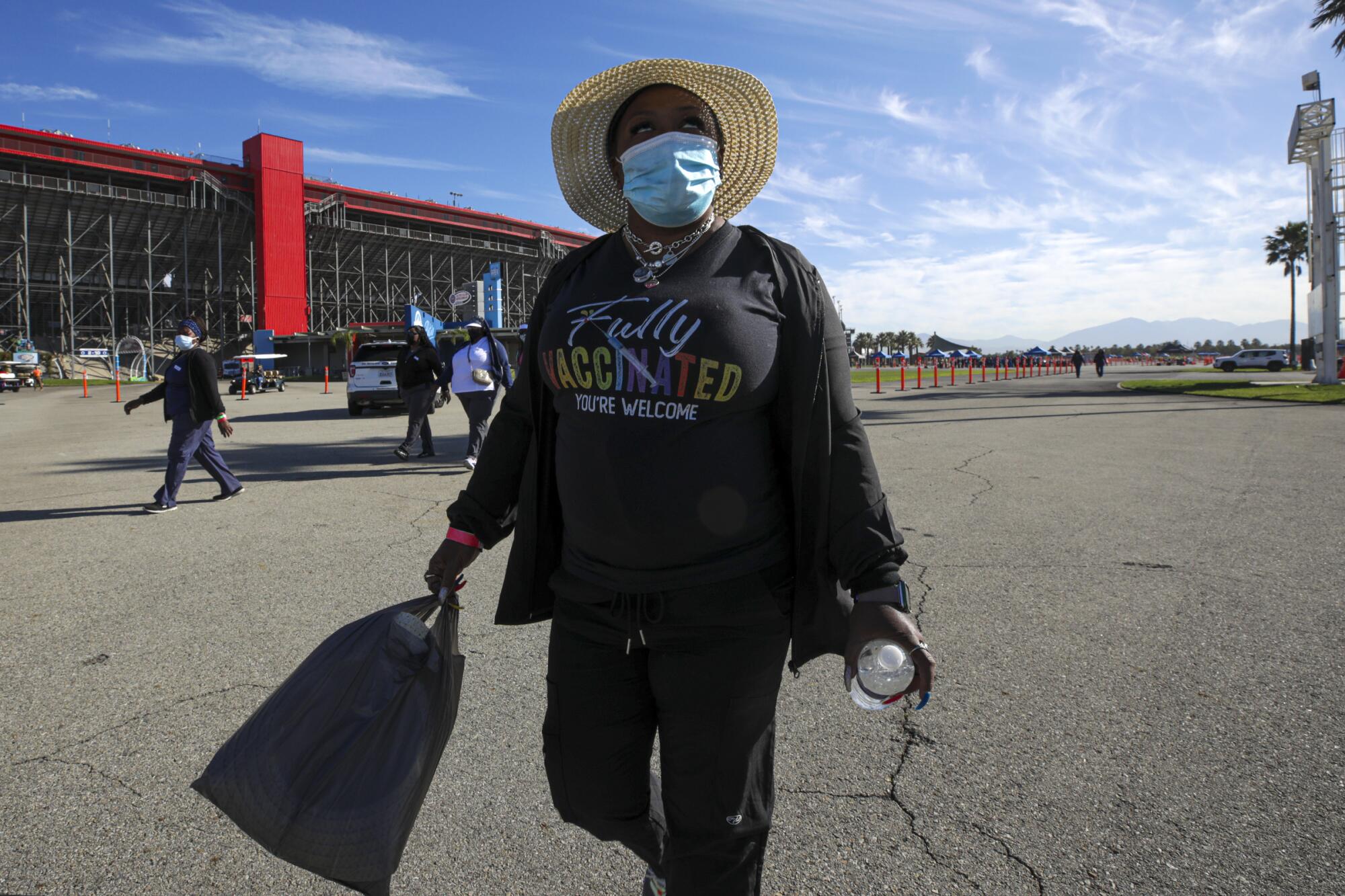
“If his day’s going good, he’s not calling,” she said. “Sometimes I have to call him and say, ‘Did you forget about me?’”
Although some of the travel nurses came with their families, many were apart from their children. They used bathroom and lunch breaks to check on home, and the break room served as an unofficial parenting zone. It’s where Upshaw called her daughters on FaceTime shortly after 2 p.m.
She reminded the girls to pack a game for their brother, get their little sister’s clothes together and make sure they cleaned the house.
Because the next day they were flying to California to support Upshaw on the anniversary of her mother’s death. Upshaw hadn’t held them in her arms for more than a month.
“Every time I think about them, I tear up,” she said. “I can’t wait.”
By 3 p.m. Upshaw was back outside, where time seemed to move slower than it did in the busy convention center. During lulls, the nurses sat underneath gray and blue canopy tents at the station.
They had a front-row seat to the state’s economic inequalities. They saw cars with tape holding up the bumpers and a Tesla Model X with doors that opened like wings. But even more noticeable were the residents who weren’t coming to get vaccinated.
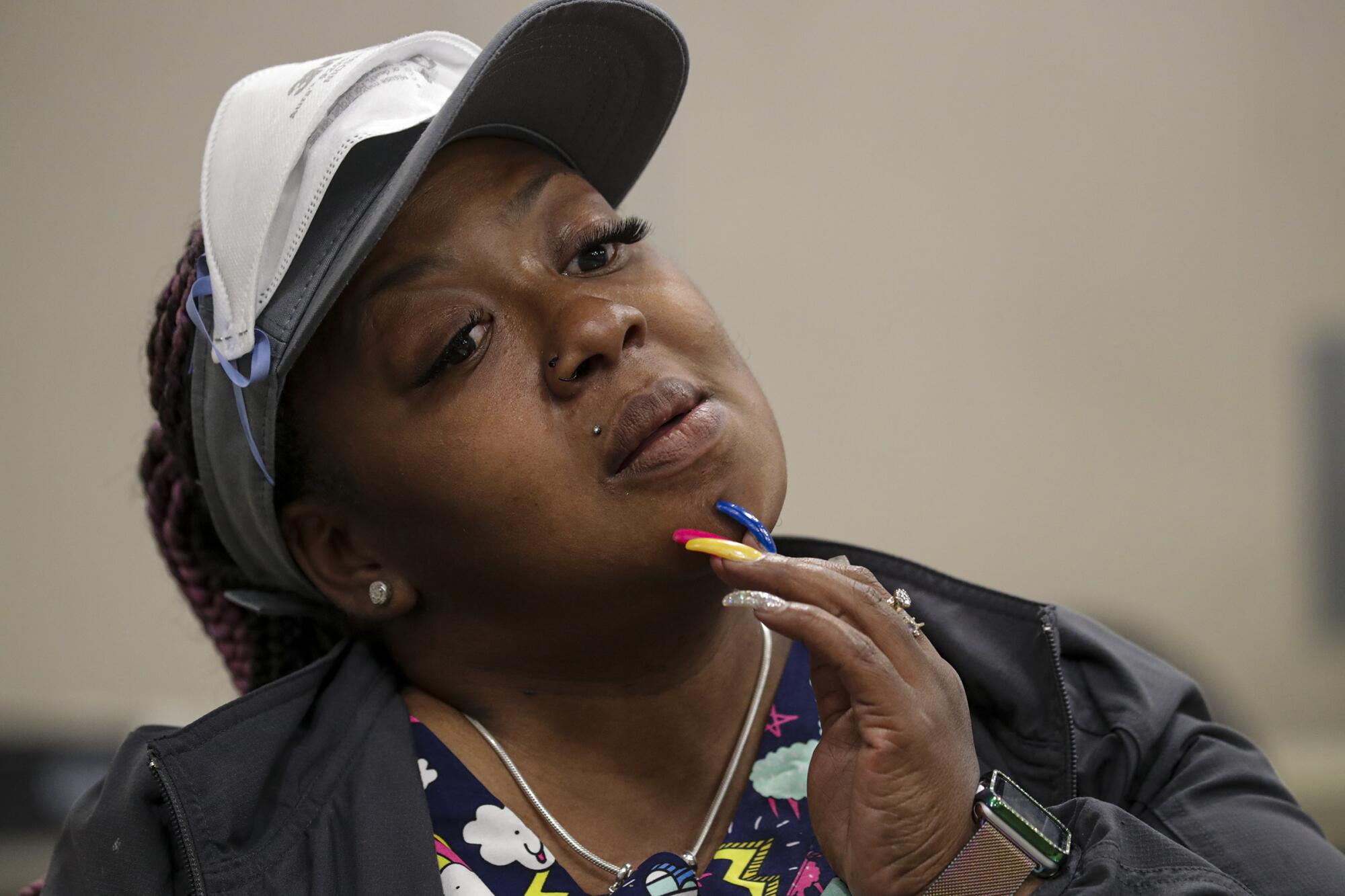
“You don’t see many African Americans here,” said Jasmine Chestnut, a travel nurse who got her first dose before she arrived. “It’s so disappointing.”
In the nursing home where Chestnut had worked back home in Syracuse, more than 30 residents caught COVID-19. Her father’s best friend died because of the virus.
“It bothers me that so many people don’t get it,” Chestnut said of the vaccine. “After my father lost his friend, he was begging for it.”
As the day wore on, the winds turned chilly and the setting sun tinged the sky pink. The nurses packed up the tents and chairs before they headed inside to help clean up.
The site manager tallied the total vaccinations. No sparkling cider celebration today, but they had vaccinated 764 people.
The next night, Upshaw was still in her scrubs when her children piled into the hotel lobby.
Within 20 minutes, she found herself refereeing arguments, comforting her son about the “scary” flight and cleaning up her youngest daughter’s apple juice spill in the lobby.
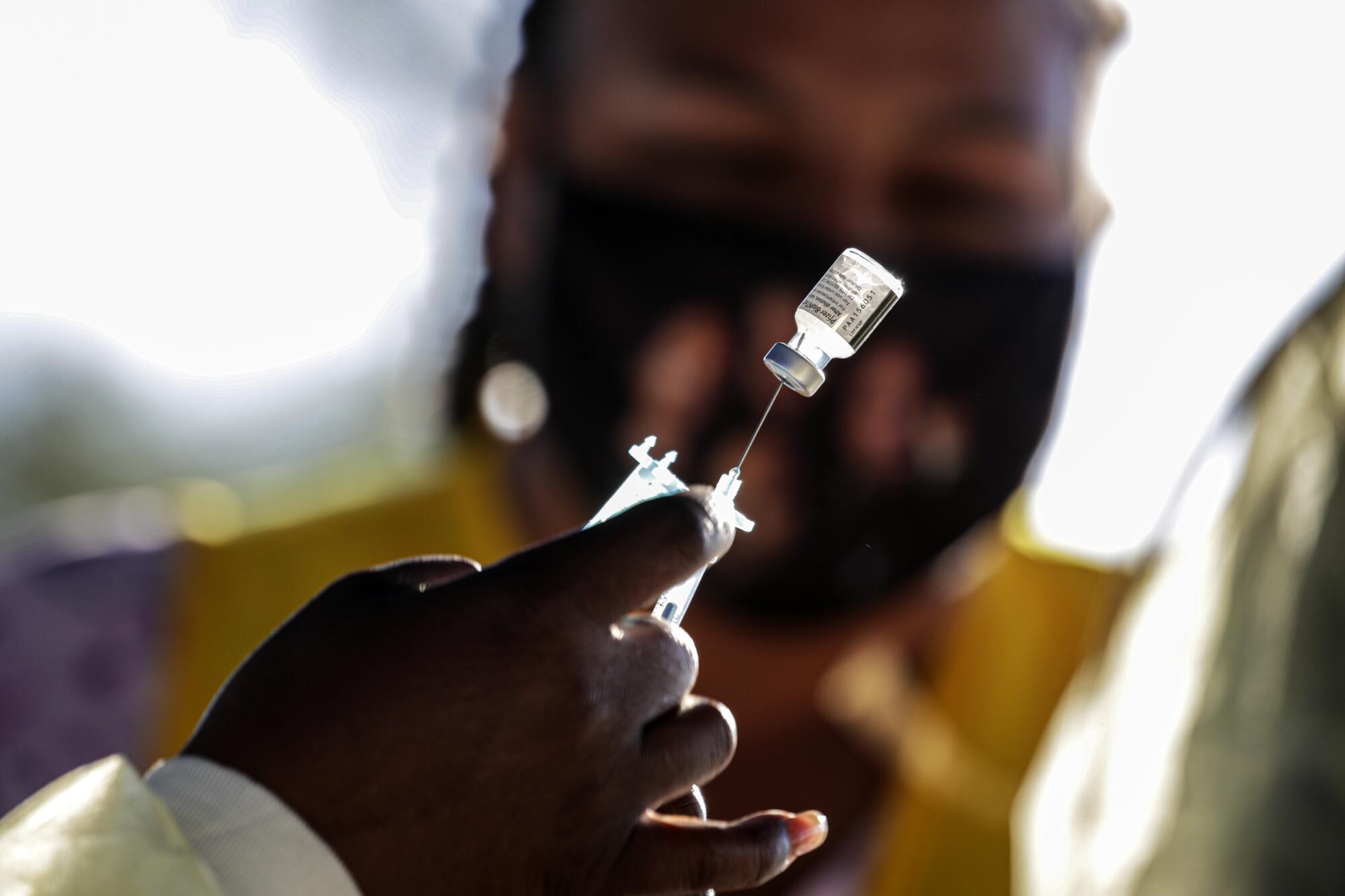
Rashianna Moore, 24, was grateful she was old enough to help out with her siblings, but relieved to be reunited with their mom.
“We were sad, but we ended up adapting to it because we knew it was what was best for her,” she said.
“I love that she’s a nurse and that she cares for others,” her daughter added. “I’m happy and thankful that she cares for others as much as she cares for herself and her family.”
Her mother inspired her. She’s now studying to become a registered nurse. Maybe one day she’ll travel too.
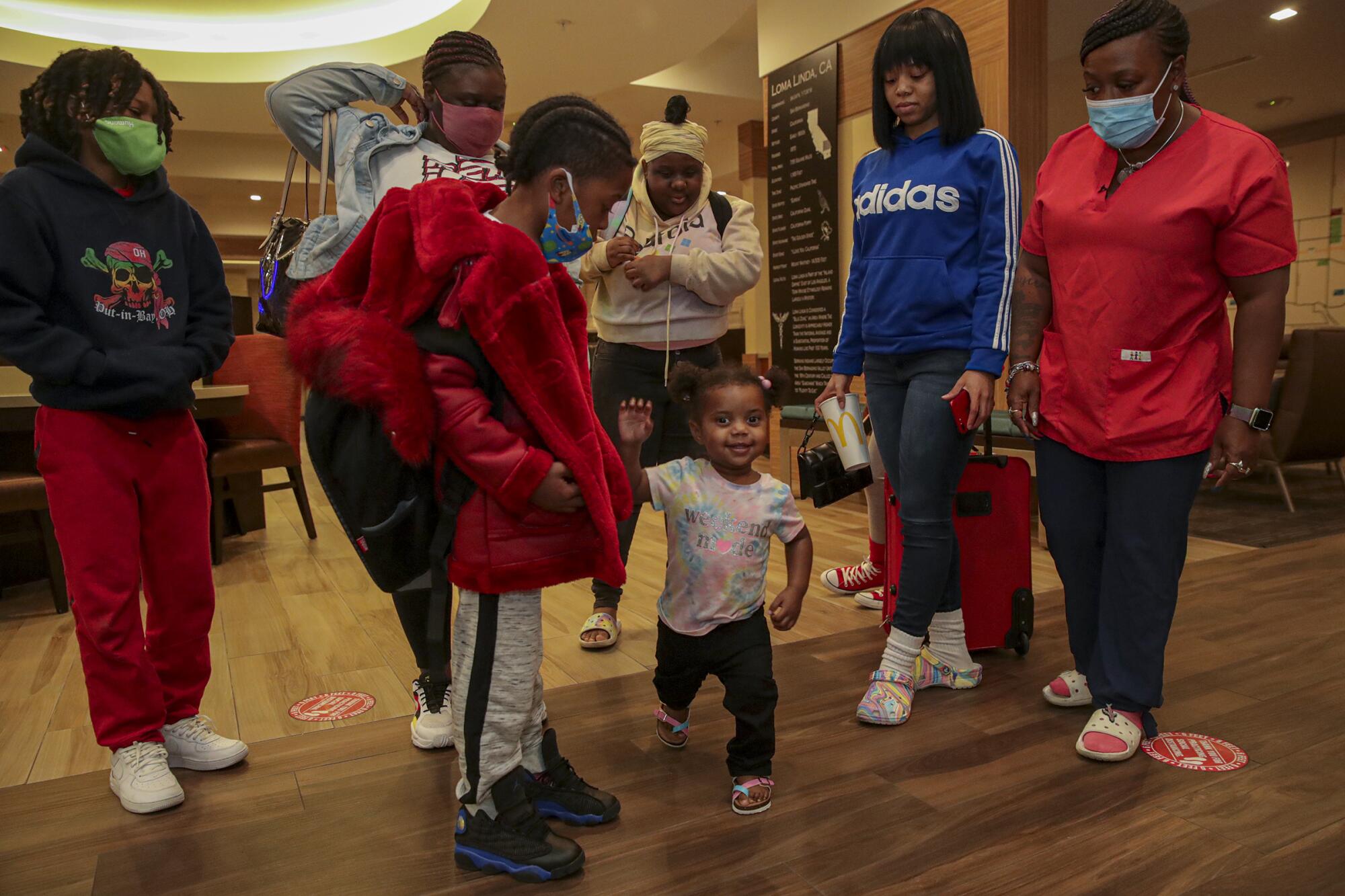
More to Read
Sign up for Essential California
The most important California stories and recommendations in your inbox every morning.
You may occasionally receive promotional content from the Los Angeles Times.


